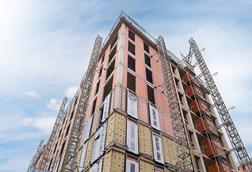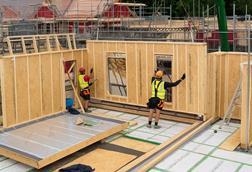Why PCSAs are becoming a strategic tool in construction delivery
Early contractor involvement is often the difference between a buildable scheme and one that struggles to progress. James Rivers at Churngold Construction considers the benefits of a PCSA
Someone the industry can do business with: the Building Safety Regulator chair impresses wherever he goes
He’s less than a year into the job but in appointing Andy Roe as its boss, the government seems to have struck gold, writes Dave Rogers
Regen Connect: joining the dots between local ambition and industry delivery
At a pivotal moment for urban regeneration, Building’s editor Chloe McCulloch introduces a new editorial campaign designed to connect local priorities with the industry expertise needed to deliver real change
Why Network Rail should pay heed to John McAslan’s light-touch Liverpool Street station redevelopment plan
It has been arguably the most chaotic development process of any major project in the UK over the past decade but the latest proposals could well be the best way forward, says Tom Lowe
We can solve the UK’s housing crisis by protecting smaller builders
The backbone of postwar Britain’s vast housebuilding drive, small builders now face extinction as regulatory barriers and policy layering make it ever harder for them to compete, build and survive. Hugo Owen has some solutions
UK data centres: How to close the delivery gap
Our ability to meet the almost insatiable demand for more data centres in the UK is being tested to the limits. Ed Phillips, partner at Wedlake Bell, assesses the challenges in front of us
More optimism means more architects: Why the big practices are getting bigger
The latest survey of top architecture firms for Building’s sister title Building Design shows recruitment at the top 10 practices is increasing faster than elsewhere as they take advantage of growing markets in North Africa and the Middle East. Thomas Lane crunches the data
City slickers stuck in the sidings: London’s commercial market could do with a leg up
Funders weigh up risks, developers push back start dates and contractors fret about workloads, writes Dave Rogers
How housebuilders can take a sustainable approach to placemaking
Sustainability in housebuilding encompasses everything from construction to placemaking to future skills requirements. Keepmoat’s John Bowden says housebuilders must integrate all these elements in their projects – with placemaking at the centre
2026 will be the year of gateway 3. This is how to make sure you are prepared
The BSR has made good progress in easing the logjam at gateway 2 of the approval process. Mark Brooks explains what comes next
This month’s construction industry gossip: Touching tributes
The latest chatter around the industry
The shape of place: designing social value through data and dialogue
Place-based social impact starts with understanding local needs. By combining open data with community voices, we can design projects that deliver meaningful change where it matters most, Ellie Jenkins writes
The year we’re meant to feel richer – but hiring tells another story
Construction shows resilience and growth forecasts for 2026 offer hope, yet the jobs market is shrinking and fears over the Employment Rights Act loom large, writes Chloe McCulloch
Simplification, AI, robotics? Finding the fix for construction in 2026
Market sentiment took a battering in 2025, and viability remains a huge challenge. Simon Rawlinson of Arcadis considers where the bright spots are and how construction can take a little more control of its destiny this year
Coach on the ground: navigating uncertainty in 2026 with confidence
In the first of a three-part series, leadership coach Mimi Dietrich considers how volatility is reshaping every corner of the built environment and leaving many professionals overwhelmed. She shares how leaders and teams can replace anxiety-driven reactions with resilience and confidence to thrive in uncertain times
Setting up a business partnership? Don’t dispense with the formalities
Barney Leaf explains how deadlock agreements can help all parties when business partners break up
Expert witnesses: what’s the price of a change of mind?
When an expert witness changed his mind under cross-examination, should that have impacted the costs award?
How construction firms must get in line with new payroll rules
What umbrella payroll legislation means for construction and why firms need to act now
Construction law at the turn of 2026: looking backwards and forwards
Cases on defective premises dominated construction law in 2025, and 2026 is likely to follow suit
Misrepresentations on nomination form invalidate adjudication
A recent TCC ruling serves as a useful reminder of sticking to facts and a simple opinion on suitability or otherwise on adjudicator nomination forms
Payment rigmaroles – it just shouldn’t be that complicated
It’s that darned payment regime again! Even the courts are getting sick of it now and calling for common sense
All construction firms need an AI use policy – but how do you start?
Iain Simmons sets out the minimum requirements for an effective AI use policy in the construction sector
Clauses designed to help avoid conflict in JCT construction contracts
How updated provisions in JCT 2024 are helping drive behavioural change in the industry towards conflict avoidance






























































